________________
H
APRIL, 1894.1
MISCELLANEA.
111
was found very useful." Then a few Maithilimentary on the first two verses of the Dhammasongs, in the vernacular of the present day, are påda, containing the legends of Chakkhupala and added, and the whole is complete. I remember of Maddhakundali, by MM. de la Vallée-Pousseeing one called somebody or other's karana. It sin and Godefroy de Blonay. The first legend was acted with éclat, but I do not believe that teaches how miefortune follows an evil act, as the (beyond a few who had studied the libretto cart-wheel followa the yoked ox, and the second beforehand) the audience understood one word that faith in the Buddha, without works, is of what was said or sung by the actors. I sat sufficient for salvation. next tho ráje, at whose expense the whole thing M. Darmesteter's French translation of the was done. In one of the more florid songs in the Zend Avests, with notes, historical and philovernacular (ais own mother tongue) which I had
logical, has been frequently reviewed since its vainly followed, I asked him if he could under- appearance. The erudition and competence of stand it. "Of course, not a word," said he. Yet the translator were certain to make this an he was himself a very fair Sanskrit scholar. 'If
epoch-founding work; but it has been more than he could not understand what was being said,
this : for, as Prof. Max Müller observes, it has what could be expected of the crowd of muschibs, thrown a bomb-shell into the ranks of Zend who sat behind us, or of the peons and other scholars. Prof. Darmesteter advances a theory hanyers on, who crowded in in the rear Yet all that the Gotthas, the oldest portion of the Zend were pleased, and followed the tamdisha with
scriptures, do not date further back than the first interest. They knew the story, and would have
century after Christ. This is a bold statement followed it equally well, if it had been dumb show to make regarding a book, which scholars had I do not believe that in Bhavabhati's, or even hitherto regarded as being more than two Kalidasa's, time things were much different. As
thousand years older than this; and the proposition studies for the closet, their works were admired
has provoked, and will provoke, most lively disas chamatkara, and hence had a reputation which
cussion. Prof. Darmesteter has spared no pains ensured a large audience (which could not, or
to ensure the utmost possible correctness in his could only partly, understand them) at their translation. Instead of following the not always representations.
very trustworthy guide of doubtful etymologies, III.
he has visited India, and gone himself as In the Revue de l'Histoire des Religions for near the fountain head as possible. With May-June, 1892, M. Barth contributes another the assistance of learned Pârsis, he has inti important review: - this time of the first volume mately studied the ritual of the religion, and has of Prof. Max Müller's translation of the obtained access to manuscripts hitherto unpub. Hymns of the Rig Veda, published in the Series lished, which have thrown much light on disputed of the Sacred Books of the East. The book con
passages. tains the hynins to the Maruts, Rudra, Váyu and
Another work which has been issued under the Vata, and a great portion of it is a revised edition
auspices of the Musée Guimet, but which can of his well-known translation of de Hymns to the
hardly be snid to have excited much controversy : Maruts, published in 1869. Most of the article is
for all the reviews, which I have seen, have been devoted to criticism of the translation of isolated
unanimous in ditfering from the author, has been passages, but M. Barth also, while paying a just
the first volume of M. Paul Regnaud's Le tribute to the learning and brilliant style of the
Iligvida et les Origines de la Mythologie Indo. Oxford Professor, gives expression to the regret,
Européenne. I confess that I am compelled to which more than one of us have felt, that advan.
side with the majority. I willingly admit the tage was not taken, in republishing the Hymns
labour which the author has expended and the to the Maruts, to omit much surplusage, and to zeal and industry which he exhibits, but he goes bring the commentary up to date.
too far when he claims to be a legitimate follower The number of September October, 1892, of the of Bergaigne. Bergaigne was a reasonable man. same Revue, contains the translation of a com- He sometimes, like every one, made a slip, but 8 Mr. Cowell's Vararuchi was the one book which I |
In the January 1899 number of the same Revue, could not keep during my service in Tirhat. No M. Paul Regnaud discusses the meaning of the Vedio pandit who saw it could resist the temptation of bor- word iraddha, and compares it with the later Saurkrit rowing and forgetting to return it. I had to purchase use of the word. Curiously enough he makes no copy after copy, till I resolved never to lend it to any allusion to the sharp distinction between bhakti and one. Since then it has been safe, but I earned the title sraddha, which is insisted upon in the Sandilya Sutras, of pustaka-pisdicha!
a modern work it is true, but undoubtedly containing much ancient tradition.




